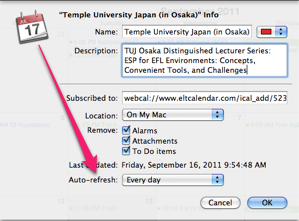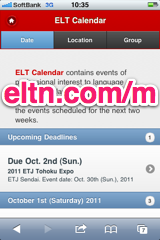Oita JALT:
�A Fluency First Approach through Extensive Writing in the EFL Context
Date: Sunday, September 11th, 2011 Time: 1:00 PM - 3:00 PM
Speaker: Steven Herder
Description:
Short Summary:
Since 2007, I have been stunned at my students' response to extensive writing (EWr). Their engagement and self-confidence in writing, their speed and fluency have all increased dramatically. EWr offers a chance for teachers to connect with students in an innovative, meaningful way. This workshop will provide a theoretical framework for L2 writing in an EFL context, and share results from the past 2 years of my EWr program in a Japanese high school.
Abstract:
Nakanishi (2006) claims that in Japanese high school L2 writing classes, students have very limited experience in writing, and that sentence-level translation and vocabulary training are still the norm. Hayashi (2003) concluded that one-sentence translations seem to be an inefficient method for improving writing ability. One innovative response to this situation is to focus on fluency over accuracy in high school EFL writing classes in Japan. Research on this innovation comes from three writing classes, totaling 50 students, who practiced EWr from April 2007 to December 2008. This workshop aims to share qualitative and quantitative results from this meaning-based, extensive writing (EWr) program through a triangulated approach: by analyzing student writing samples, by reporting student survey data, and by assessing the Japanese context through an interview with a highly-respected, veteran Japanese Teacher of English (JTE). Despite initial apprehension, students perceived considerable value in being taught L2 writing by an NT. There were significant gains in their writing fluency and, even more importantly, learners themselves recognized their own growth as writers; they enjoyed studying English more by sharing opinions with other classmates, and they claim to have learned to better express those opinions in written form. Overwhelmingly, they left the course satisfied and wanting to continue to improve their L2 writing at university. For any other Japanese high schools interested in improving or innovating their own writing classes, this workshop includes ample evidence of success and a road map to setting up an EWr class.
Bio:
Assistant professor at Doshisha Women’s College of Liberal Arts International Studies Department
Co-founder MASH Collaboration (Meet, Ask, Share & Help) Co-founder iTDi (The International Teacher Development Institute) iTDi Teacher Training Program DirectorProfile:
Steven has been teaching within the Japanese EFL context since 1989. Having extensive teaching experience at the elementary and secondary school level, he is currently an assistant professor in the International Studies department at Doshisha Women’s College of Liberal Arts. He is also extremely active in professional development within the ELT community: founding MASH Collaboration in 2007, editing numerous articles, academic volumes and proceedings, and leading teacher training seminars for various companies throughout Japan. Steven works from the perspective that, “being a teacher means a never-ending commitment to learning”.
Organization: Oita Chapter of the Japan Association for Language Teaching (Oita JALT)
Cost: please see here for details
Venue: Oita International House, Beppu
Location: Beppu City, Oita Prefecture, Japan
![]() Add this to iCal
Add this to iCal
![]() (Need help?)
(Need help?)
![]() Add to Outlook
Add to Outlook
![]() (Need help?)
(Need help?)
You can add this event to your iCal calendar.
- Click on the iCal icon. Your iCal software will start.
- Click 'Subscribe':

- Under 'Auto Refresh', select 'Every day' in case the the basic details change:

You can add this event to your Microsoft Outlook calendar.
- Click on the MS Outlook icon.
- See what happens.
- Tell us what happens. I don't have MS Outlook on a Windows computer, so I can't test it.
- If you click on the icon and nothing happens, do this:
- Right-click on the icon and save the file.
- According to Microsoft's support page, in Outlook's File menu, you should click Import and Export.
- Click to select Import an iCalendar or vCalendar file (*.vcs), and then click Next.
- Click to select the vCalendar file you've just saved, and then click Open.
Contact Oita JALT
Website: https://jalt.org/groups/chapters/oita
Email QR Code:





